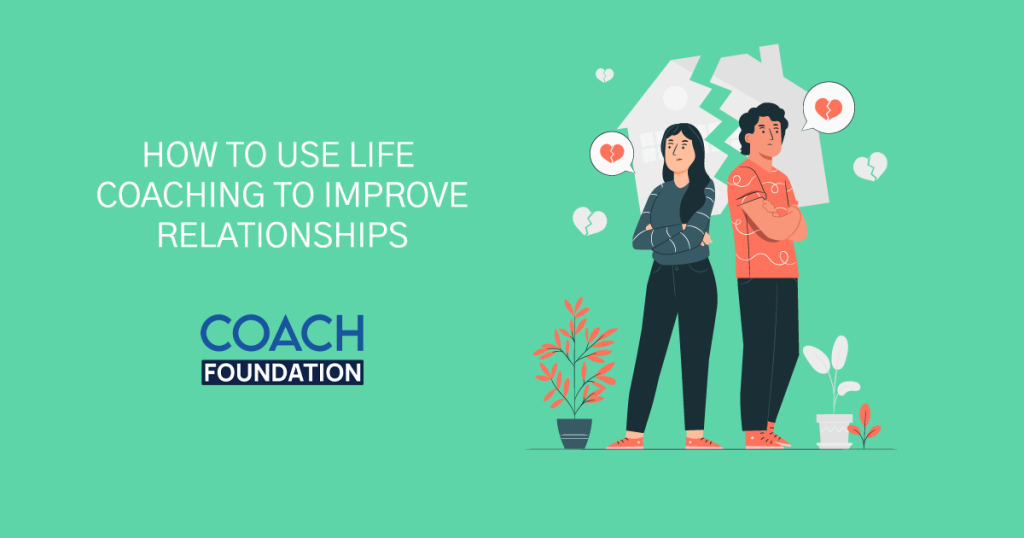Blog » Coaching Business » How to Use Life Coaching to Improve Relationships
How to Use Life Coaching to Improve Relationships
In the dance of life, relationships often take center stage, shaping our experiences and influencing our well-being.
Through active engagement and practical insights, life coaching becomes a valuable tool in the journey toward building healthier, more fulfilling relationships.

In this article, we delve into the transformative power of life coaching and how it can be a catalyst for enhancing the fabric of our connections with others. So, get ready to take your relationships to the next level with the power of life coaching.
Life Coaching and Relationships
Are you struggling to navigate your relationships and find common ground with your partner?
Life coaching can play a crucial role in helping you improve your relationships by providing guidance and support.
From addressing communication issues to navigating relationship challenges, life coaching can help you gain clarity and develop the skills necessary to build stronger, more fulfilling connections with your loved ones.
The Role of Life Coaching in Relationships
When you engage in life coaching, it can significantly enhance your relationships.
Life coaching plays a crucial role in helping you build and maintain healthy and fulfilling connections with others.
Through the guidance and support of a life coach, you can gain valuable insights into your own behavior patterns, communication styles, and emotional triggers that may be affecting your relationships.
A life coach can help you identify any limiting beliefs or negative thought patterns that are hindering your ability to connect with others effectively.
They can also provide you with the tools and techniques to improve your communication skills, resolve conflicts, and set healthy boundaries.
If you aspire to become a life coach, it’s essential to prioritize obtaining a certification in relationship coaching for optimal results.
Life Coaching and Relationship Challenges
If you’re facing relationship challenges, life coaching can provide you with the guidance and support to overcome them.
Relationships can be complex, and navigating through issues can be challenging. However, with the help of a life coach, you can gain valuable insights and strategies to address these challenges head-on.
A life coach can help you identify underlying patterns or beliefs that may be contributing to the issues in your relationship.
They can also assist you in developing effective communication skills, setting boundaries, and improving your overall emotional intelligence.
Through personalized coaching sessions, you can gain a better understanding of yourself and your partner and work towards building a healthier and more fulfilling relationship.
Life Coaching Strategies for Relationship Improvement
Here are some effective strategies that certified life coaches often use to assist clients in forming healthier relationships:
Enhancing Communication Skills
Improving communication is paramount to nurturing healthy relationships and ensuring effective interpersonal interactions. One fundamental way to enhance this skill is through active listening.
Improve your communication skills by practicing active listening and using ‘I’ statements.
Active listening involves fully engaging with the person speaking, paying attention to their words, body language, and emotions.
Show that you’re present and interested in maintaining eye contact, nodding, and providing verbal feedback.
Avoid interrupting or formulating your response before they’ve finished speaking. This will help you gain a deeper understanding of their perspective and foster better communication.
Additionally, using ‘I’ statements can prevent misunderstandings and defensiveness. Instead of blaming or accusing the other person, express your feelings and needs using phrases like ‘I feel’ or ‘I need.’
This allows for open dialogue and encourages the other person to listen and respond empathetically.
Building Emotional Intelligence
You can enhance your emotional intelligence and improve your relationships by developing self-awareness and practicing empathy.
Emotional intelligence refers to the ability to understand and manage your own emotions, as well as recognize and respond to the emotions of others.
By becoming more self-aware, you can better understand your own feelings and reactions in different situations.
This self-awareness allows you to regulate your emotions and respond in a more constructive way rather than reacting impulsively or defensively.
Additionally, practicing empathy involves putting yourself in someone else’s shoes and trying to understand their perspective and emotions.
This helps build trust and strengthens your relationships by showing others that you genuinely care about their feelings and experiences.
Remember, building emotional intelligence takes time and practice, but it can greatly enhance your personal and professional relationships.
Conflict Resolution and Problem-Solving
Now, let’s talk about conflict resolution and problem-solving in your relationships.
It’s important to set and manage boundaries to prevent conflicts from escalating. By establishing clear expectations and communicating openly, you can address issues and find solutions together.
Setting and Managing Boundaries
To effectively navigate conflicts and solve problems in your relationships, it’s important to establish and maintain clear boundaries.
Boundaries serve as guidelines that define acceptable behavior, expectations, and limits within a relationship.
By setting boundaries, you create a framework that promotes respect, communication, and understanding between you and your partner.
It allows both of you to feel safe and secure, knowing what’s acceptable and what’s not.
When conflicts arise, having clear boundaries in place can help you address the issue directly and effectively. You can communicate your needs and expectations while also listening to your partner’s perspective.
By managing and respecting each other’s boundaries, you can work together to find solutions and resolve conflicts in a healthy and productive manner.
Conclusion
In conclusion, life coaching can be a powerful weapon for improving relationships.
By gaining self-awareness, enhancing communication skills, and setting clear goals, individuals can transform their personal connections for the better.
Remember that building stronger relationships takes time and effort, and the guidance of a skilled life coach can provide valuable insights and support along the way.
Whether you’re looking to strengthen your romantic partnership, mend family bonds, or foster better connections with friends and colleagues, life coaching can be a stepping stone towards more fulfilling and harmonious relationships in your life.
So, take that first step towards positive change and start your journey towards healthier, happier connections today.
Frequently Asked Questions
Is Life Coaching Effective for All Relationship Types?
When it comes to improving relationships, life coaching can be effective for various relationship types.
Whether you’re in a romantic relationship, a friendship, a family relationship, or even a professional relationship, life coaching can help you navigate the challenges and improve the dynamics.
Life coaching basically provides tools and techniques that can enhance communication, build trust, and strengthen connections.
It can help individuals gain clarity about their own needs and desires and also understand the needs and perspectives of others.
How Does Life Coaching Address Relationship Challenges?
Life coaching addresses relationship challenges by providing individuals with valuable tips and strategies to improve their interactions and dynamics with others.
Coaches help clients identify and understand their communication styles, emotional triggers, and relationship patterns.
Through personalized guidance and goal setting, life coaches empower clients to develop better listening skills, empathy, and conflict-resolution abilities.
They may also facilitate discussions to foster understanding and compromise within relationships.
Life coaching emphasizes self-awareness and personal growth, enabling individuals to build healthier connections.
While it’s not a substitute for therapy in severe cases, life coaching can be effective in promoting positive change and enhancing various types of relationships.


ABOUT SAI BLACKBYRN
I’m Sai Blackbyrn, better known as “The Coach’s Mentor.” I help Coaches like you establish their business online. My system is simple: close more clients at higher fees. You can take advantage of technology, and use it as a catalyst to grow your coaching business in a matter of weeks; not months, not years. It’s easier than you think.
AS SEEN ON
0 Comment